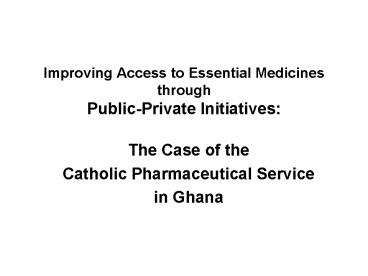Improving Access to Essential Medicines through PublicPrivate Initiatives: - PowerPoint PPT Presentation
1 / 13
Title:
Improving Access to Essential Medicines through PublicPrivate Initiatives:
Description:
Ghana is a tropical country situated in the West Coast of Africa ... The initiative is funded by Bill and Melinda Gates Foundation ... – PowerPoint PPT presentation
Number of Views:24
Avg rating:3.0/5.0
Title: Improving Access to Essential Medicines through PublicPrivate Initiatives:
1
Improving Access to Essential Medicines through
Public-Private Initiatives
- The Case of the
- Catholic Pharmaceutical Service
- in Ghana
2
ABSTRACT
3
Background
Demographic Profile Population 18,912,079 Sex M
ale 49.5 Female 50.5 Locality Rural 56.2
Urban 43.8 Growth Rate 2.7
Health Status U5 Mortality Rate 107.6/1000 Infant
Mortality Rate 56.7/1000 Maternal Mortality
Rate 214/100,000 Life Expectancy 58years HIV
Prevalence 3.8
Population Per Health Facility By Provider
Ghana is a tropical country situated in the West
Coast of Africa and located between latitudes 4
11 North of the equator
4
Background
- Strategies to Enhance Access to Medicines (SEAM)
is an initiative created by MSH to improve access
to medicines in developing countries. The
initiative is funded by Bill and Melinda Gates
Foundation - SEAM country programs are developing and testing
various models of public-private collaborations
to improve access to medicines in the countries
participating in the program and also to identify
models that can be deployed in other countries
facing similar access problems - In Ghana, the Catholic Health Service was
identified as one of the two private sector
institutions to implement a SEAM Program
5
Background
- Faith-Based organizations provide 40 of all
health services in Ghana - The Catholic Health Service, the largest body
provides 75 of mission sector health delivery - Services are delivered through 31 hospitals, 66
clinics maternity homes, 4 drug supply depots,
situated mostly in rural areas in 18 autonomous
dioceses throughout Ghana - Access problems identified
- Availability - drugs out of stock 35 of time
- Affordability - Nearly a fifth of daily wage
required to treat adult malaria in mission sector - Rational use - average of 5 items on a
prescription
6
Project Objectives
- Improve capacity of Catholic Pharmaceutical
Service to achieve better pricing and more
reliable supply service - Improve quality of prescribing and dispensing
services by promoting the rational use of drugs
7
Interventions
- Organized meetings with Bishops, Administrators,
and Hospital managers to get buy-in and consensus
agreement on approaches for pooled procurement,
MIS and Rational Drug Use - Established a pooled procurement model for
procuring and delivering medicines to facilities,
re-engineered existing structures, carried out a
tender for 20 drugs, and trained facilities in
inventory management
8
Interventions
- Trained a team of 4 health professionals from
each of 5 hospital on promoting RDU at health
facility level using Drugs and Therapeutic
Committees, in a learn and do cyclic approach
Catholic Health Service DTC Design Learn do
Cyclic Approach
Adapting training Material Local Intl
Experts
Selection of Facilities and DTC team
Training ( 2-days)
Implementation And Follow-up in Health
Facility (8 weeks)
9
Results
Pre-Intervention Results for Access dimensions of
Availability, Affordability and Quality of
Service
AVAILABILITY
AFFORDABILITY
RATIONAL USE
Post-Intervention Evaluation of Access Dimensions
is scheduled for Oct 2004 Jan 2005
10
Key Milestones
- Procurement of 20 essential drugs by tender using
quantities from 29 facilities yielded on average
20 savings in price - Five facilities piloting the DTC program
established DTCs in their facilities after first
module training - The effects of these milestones on availability,
affordability and rational use of medicines will
be determined in a post intervention evaluation
scheduled for Oct 2004 - Jan 2005
11
Implications
- Building Capacity and Structures for sustainable
implementation of Program - Maintenance, sustainability vrs staff attrition
- Providing Technical Assistance vrs Capital
Investments - Ownership of program and commitment of
implementing partner
12
Implications
- Pooled Procurement Systems
- Ability to enforce requirements of tender
contracts - Suppliers Delivery of Goods on schedule vrs
Clients Payment for Goods on time - Timely information flow for forecasting,
procurement, payment and delivery decisions - Prequalification of suppliers
- DTC Program
- Training
- Skill development vrs information dissemination
- Credible Expert Trainers, local/international
- Providing support for institutional work
13
Conclusions
- The project has demonstrated that where there is
commitment, appropriate leadership, and
ownership, group purchasing program can be
implemented to make great savings - The learn and do cyclic approach to DTC
training has ensured that skills are acquired and
maintained through real field experience within
the environment of the practitioner - Linking the implementation of pooled procurement
with DTC programs strengthens institutional
capacity for sustainability






























